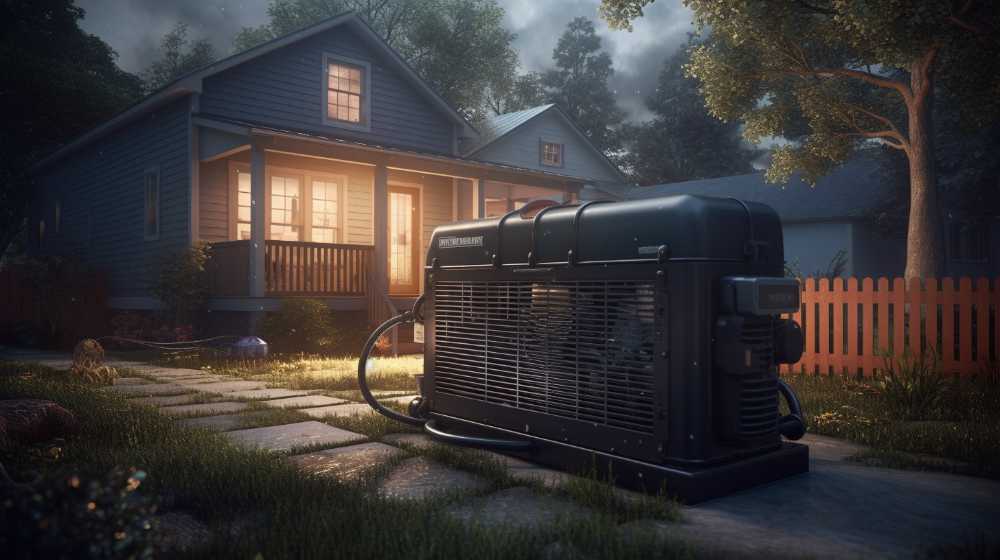Last Updated on May 25, 2023 by Rod Olivares

Whole house generators can be an excellent investment for most homeowners. Not only do they provide reliable electricity during power outages, but they also can help reduce energy costs in the long run. It costs a dime to install a whole-house generator, so you probably want to know whether any tax breaks or other financial incentives help cover the expense. Is there a tax credit when you purchase a home generator? The answer can be pretty complex.
Although you are not always qualified for tax credits if you buy a whole-house generator, financial incentives and deductions may be available. These credits and deductions may vary depending on your state and jurisdiction and the kind of generator you have. Only generators that meet local criteria and regulations considered “energy efficient” will be eligible for these credits.
Are you considering purchasing a whole-house generator? Read on to learn about the tax credits available (if there are any) before deciding whether or not to purchase one.
Understanding Generator Tax Credits
You need to understand one crucial distinction between tax credits and deductions.
Tax credits reduce your overall tax obligation dollar for dollar, so for every $1 you claim, you pay one dollar less in taxes. A deduction can only lower the amount of your taxable income.
Deductions may be available for certain costs related to installing and purchasing a whole home generator. Costs associated with wiring, permits, installation, and upkeep are examples of these deductions.
It is critical to remember that tax laws and incentives might change. By staying informed of the most recent information and speaking with industry experts, you can make sure you have accurate and current information on tax incentives for whole house generators.
Does A Whole House Generator Qualify For Tax Credit?

If you consider purchasing a generator and know what size generator you need, you may wonder if this qualifies for an energy credit.
Unfortunately, purchasing a whole-house generator, portable generator, or standby generator does not automatically qualify you for tax credits.
Under the Energy Star tax credit guidelines, the federal government does not expressly provide tax credits for installing a whole-home backup generator.
However, you can be eligible for financial incentives and deductions available. Governments in several states provide tax breaks and subsidies for establishing backup power systems.
The answer will depend on your location and the type of generator you are looking to purchase.
Qualifications and Variations on Location
Not all generators will qualify for tax incentives—only those considered “energy efficient” by local standards and regulations. Before purchasing, it is best to check with your local authorities or tax advisor to learn more about the qualifications.
For instance, California’s Self-Generation Incentive Program (SGIP) grants tax rebates to individuals who build specific backup power systems.
Yet, this does not ensure a tax credit for your whole-home backup generator. California’s SGIP only provides subsidies for sources of renewable energy.
Purchase and installation of alternative energy equipment may be eligible for a 10% tax credit in various jurisdictions, including New Jersey. The system installation must be permanent and adhere to all local and state construction rules to be eligible for the tax credit in New Jersey.
In other states like Massachusetts, buying a residential energy-efficient property can qualify you for a taxpayer credit for energy-efficient improvements such as whole house generators. This credit is available to taxpayers who have paid taxes on the residence in that same year.
Generally, your state or jurisdiction may have different tax credit policies if you utilize a whole-house generator. Some tax credits and their requirements change over time and depend on where you live.
Financial Incentives for Whole House Generators
While a whole house generator has no specific tax credit, some potential financial savings options are available.

Residential Energy Efficiency Property Credit
The Residential Energy Efficiency Property Credit is a nonrefundable credit of up to $500. This credit is only applicable to existing residences and not to new construction.
The appropriate energy conservation criteria specified by the federal government, or, in certain situations, the state or municipal governments, must be met by the generator or exceeded for it to be eligible.
Federal Tax Credits
Generators used to power your home may be eligible for federal energy tax credits if they meet specific criteria. You might get incentives back on your federal taxes if you install an energy-efficient generator before the end of the year in which you bought it.
Your generator qualifies as a renewable energy source if powered by solar panels or fuel cell energy. If you check energy efficiency criteria, you may quickly determine if your particular model qualifies for tax benefits.
It’s vital to note that energy tax credits have capacity restrictions, expiry periods, and other conditions. By speaking with a tax professional, You may learn whether your generator and planned usage comply with state and federal requirements.
Tax Deductions
You can deduct a part of the cost of the generator if you itemize deductions on your tax returns. These items should include installation fees from your total taxable income each year for five years. The total deduction cannot exceed $1,500 over five years.
You must have proof of purchase and installation expenses and other documents about the type of generator installed to claim these deductions.
How to Claim Credits and Deductions For Your Home Generator
Investing in a whole-house generator can also come with tax credits and deductions to help offset the cost.
Tax Credits on Capital Gains
Capital gain tax credits are tax benefits when you sell a non-inventory item, such as a house or a piece of land.
You can be eligible for a capital gains tax credit since adding a generator might raise the value of your home and enable you to sell it for a more significant profit.
Although you may not be eligible for an energy tax credit, homeowners have assured a capital tax credit on installing a whole-home generator if they earn money from selling their house. However, you are required to turn in the generator’s receipt. If not, you can also lose the capital gains tax benefit.
Consult an accountant to ascertain how much tax credit you can gain from the generator installation.
Deductions For Business Expenses
The cost of operating your home generator and the cost of the generator itself may be tax deductible as business expenses if you utilize it for a part of your business/company.
You must itemize deductions on your tax return and provide proof of the generator’s commercial usage to claim these tax benefits. To submit and obtain tax advantages, follow these steps:
Keep thorough records and documentation of all its business-related uses.
Put the price of your generator down on Schedule C or Schedule F as a business expenditure.
You may claim the home office deduction option if you run your company out of your house.
Deductions For Home Office
These days, working from home is a growing trend. Set up a home office area if you have remote or hybrid employment since doing so may result in some good tax perks and deductions.
Ensure you maintain detailed records of how you utilize the generator for your home office, including the dates, how you used it, and any other information that may prove its usage.
You could deduct the generator’s cost as a business asset over several years if it powers equipment you use for your company. Abide by all local, state, and federal regulations to benefit from tax savings.
Deductions For Medical Equipment
A generator is an excellent source of reliable energy used to power equipment for people with medical needs that call for a specific medical device.
With the frequency and severity of natural catastrophes rising, a home generator may provide power for special equipment installed for medical demands.
The procedure for deducting the cost of your generator for use with a medical expense is the same as for deducting business expenses. The key to making sure your generator complies with the deduction rule is maintaining precise records and documentation of your medical expenses using the generator.
You will need information on the product’s purchase date, price, and how it powers the numerous medical equipment in your house. Deduction-related tax legislation might vary from state to state and from one year to the next.
All taxpayers can claim a deduction for qualifying medical costs that are not repaid and exceed 7.5% of their adjusted gross income. Do itemized deductions on your Internal Revenue Service Schedule A to claim your medical expenditures as a deduction.
You must demonstrate with certainty that your medical or mental condition needs a backup whole-home generator.
Deductions for Disaster Loss
You may be eligible to claim a tax deduction for the purchase of the generator if you use it during natural disasters and a power outage.
If the generator were damaged during a natural disaster, you would be eligible to deduct the cost of the generator as a loss on Schedule A in an itemized deduction.
A generator’s cost may be written off as a capital expense if not damaged or destroyed over the years.
Conclusion
While there is no specific tax credit for a whole-house generator, investing in a generator can be eligible for a tax deduction if it meets the requirements set out by the state. It’s also helpful to keep in mind that there are many other benefits to having a whole house generator installed.
If you’re clever enough, you can claim tax breaks for home-based businesses and capital gains for the installation.
With the proper research and planning, investing in a whole-house generator can be a smart way to reduce personal or business tax liability.

Scott Krager purchased generatorgrid.com in the summer of 2020 and quickly began to buy every generator under the sun! He currently has over a dozen generators and the number is growing quickly. He lives in Portland, OR near his family and friends.
GeneratorGrid.com is an independent review business. I am not affiliated with any manufacturers and do not accept paid reviews. When you buy through my links, I may earn a commission which helps me purchase more generators for testing. - Scott Krager

